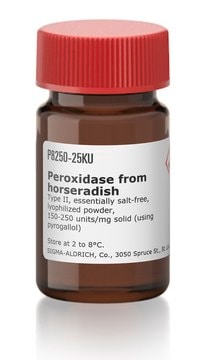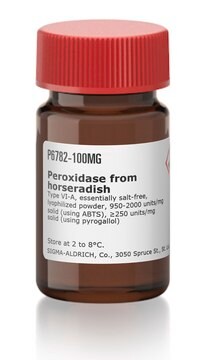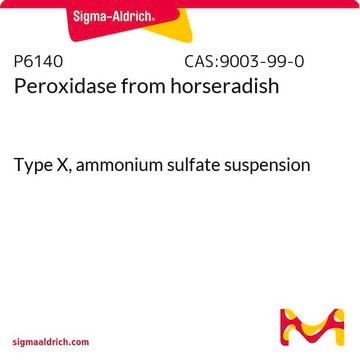10814407001
Roche
Peroxidase (POD)
EIA grade, from horseradish
Synonym(s):
POD
About This Item
Recommended Products
biological source
horseradish
Quality Level
Assay
90% (HPLC)
form
lyophilized (salt-free)
specific activity
~225 U/mg lyophilizate, 25 °C (Guaiacol, H2O2)
packaging
pkg of 100 mg
manufacturer/tradename
Roche
concentration
10 g/L
technique(s)
activity assay: suitable
color
red to brown
optimum pH
6.0-6.5
solubility
water: soluble at 68 °F
suitability
suitable for molecular biology
UniProt accession no.
application(s)
detection
life science and biopharma
foreign activity
ATPase <0.00100%, none detected
AcP <0.00100%
Catalase <0.700%
shipped in
dry ice
storage temp.
−20°C (−15°C to −25°C)
Related Categories
General description
Peroxidase can be coupled to other proteins via its amino groups, as well as its carbohydrate moiety. The reconstituted solution can be used directly for conjugation without prior dialysis.
Application
Sequence
Preparations does not contain substances that block the amino groups, but in contrast to other enzymes POD has only 2 to 3 free amino groups which are not accessible; even by extended dialysis of POD, the number of NH2-groups/mol does not change.
POD
POD contains 1 molecule of protoheme IX as prosthetic group and 2 molecules of Ca2+.
POD exists in > 10 isoenzymic forms (some sources estimate approx. 40 isoenzymes).
Carbohydrate Content
12 to 14.5 mg/100 mg Iyophilizate
Free Amino Groups
Free amino groups: 2 to 3 mol/mol enzyme
Preparation Note
Working concentration: A suggested working ratio, for immediate use in coupling procedures, is 2 mg POD to 4 mg lgG (molar ratio = 2:1, POD:IgG).
Specific activity: approximately 225U/mg lyophilizate (+25°C, guaiacol, H2O2) approximately 1,000 U/mg lyophilizate (+25°C, ABTS, H2O2, pH 5.0) approximately 3,500 U/mg lyophilizate (+25°C, tetramethylbenzidine, H2O2)
Amino groups: 2 - 3moles/mole enzyme
Isoenzymes: ≥90% isoenzyme C (HPLC)
Purity: single peak (HPLC)
Purity number: 3.0 - 3.5 (A403/A275)
Storage and Stability
Other Notes
Signal Word
Danger
Hazard Statements
Precautionary Statements
Hazard Classifications
Resp. Sens. 1 - Skin Sens. 1
Storage Class Code
11 - Combustible Solids
WGK
WGK 1
Flash Point(F)
Not applicable
Flash Point(C)
Not applicable
Certificates of Analysis (COA)
Search for Certificates of Analysis (COA) by entering the products Lot/Batch Number. Lot and Batch Numbers can be found on a product’s label following the words ‘Lot’ or ‘Batch’.
Already Own This Product?
Find documentation for the products that you have recently purchased in the Document Library.
Customers Also Viewed
Articles
Discover our peroxidase from horseradish enzymes, products, substrates, and inhibitors for your ELISA, immunoassay, and protein application needs.
Our team of scientists has experience in all areas of research including Life Science, Material Science, Chemical Synthesis, Chromatography, Analytical and many others.
Contact Technical Service














